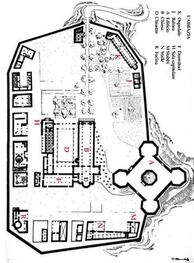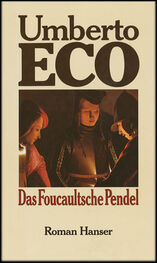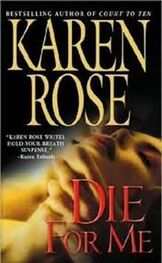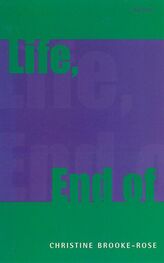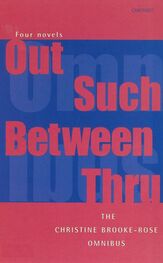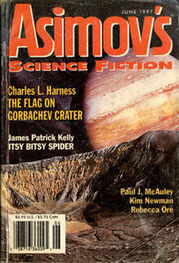My master gave me much good advice about my future studies, and presented me with the glasses Nicholas had made for him, since he had his own back again. I was still young, he said to me, but one day they would come in handy (and, truly, I am wearing them on my nose now, as I write these lines). Then he embraced me with a father’s tenderness and dismissed me.
I never saw him. again. I learned much later that he had died during he great plague that raged through Europe toward the middle of this century. I pray always that God received his soul and forgave him the many acts of pride that his intellectual vanity had made him commit.
Years later, as a grown man, I had occasion to make a journey to Italy, sent by my abbot. I could not resist temptation, and on my return I went far out of my way to revisit what remained of the abbey.
The two villages on the slopes of the mountain were deserted, the lands around them uncultivated. When I climbed up to the top, a spectacle of desolation and death appeared before my eyes, which moistened with tears.
Of the great and magnificent constructions that once adorned that place, only scattered ruins remained, as had happened before with the monuments of the ancient pagans in the city of Rome. Ivy covered the shreds of wa is, columns, the few architraves still intact. Weeds invaded the ground on all sides, and there was no telling where the vegetables and the flowers had once grown. Only the location of the cemetery was recognizable, because of some graves that still rose above the level of the terrain. Sole sign of life, some birds of prey hunted lizards and serpents that, like basilisks, slithered anion g the stones or crawled over the walls. Of the church door only a few traces remained, eroded by mold. Half of the tympanum survived, and I still glimpsed there, dilated by the elements and dulled by lichens, the left eye of the enthroned Christ, and something of the lion’s face.
The Aedificium, except for the south wall, which was in ruins, seemed yet to stand and defy the course of time. The two outer towers, over the cliff, appeared almost untouched, but all the windows were empty sockets whose slimy tears were rotting vines. Inside, the work of art, destroyed, became confused with the work of nature, and across vast stretches of the kitchen the eye ran to the open heavens through the breach of the upper floors and the roof, fallen like fallen angels. Everything that was not green with moss was still black from the smoke of so many decades ago.
Poking about in the rubble, I found at times scraps of parchment that had drifted down from the scriptorium and the library and had survived like treasures buried in the earth; I began to collect them, as if I were going to piece together the torn pages of a book. Then I noticed that in one of the towers there rose, tottering but still intact, a circular staircase to the scriptorium, and from there, by climbing a sloping bit of the ruin, I could reach the level of the library: which, however, was only a sort of gallery next to the outside walls, looking down into the void at every point.
Along one stretch of wall I found a bookcase, still miraculously erect, having come through the fire I cannot say how; it was rotted by water and consumed by termites. In it there were still a few pages. Other remnants I found by rummaging in the ruins below. Mine was a poor harvest, but I spent a whole day reaping it, as if from those disiecta membra of the library a message might reach me. Some fragments of parchment had fade, others permitted the glimpse of an image’s shadow, or the ghost of one or more words. At times I found pages where whole sentences were legible; more often, intact bindings, protected by what had once been metal studs… Ghosts of books, apparently intact on the outside but consumed within; yet sometimes a half page had been saved, an incipit was discernible, a title.
I collected every relic I could find, filling two traveling sacks with them, abandoning things useful to me in order to save that miserable hoard.
Along the return journey and afterward at Melk, I spent many, many hours trying to decipher those remains. Often from a word or a surviving image I could recognize what the work had been. When I found, in time, other copies of those books, I studied them with love, as if destiny had left me this bequest, as if having identified the destroyed copy were a clear sign from heaven that said to me: Tolle et lege. At the end of my patient reconstruction, I had before me a kind of lesser library, a symbol of the greater, vanished one: a library made up of fragments, quotations, unfinished sentences, amputated stumps of books.
The more I reread this list the more I am convinced it is the result of chance and contains no message. But these incomplete pages have accompanied me trough all the life that has been left me to live since then; I have often consulted them like an oracle, and I have almost had the impression that what I have written on these pages, which you will now read, unknown reader, is only a cento, a figured hymn, an immense acrostic that says and repeats nothing but what those fragments have suggested to me, nor do I know whether thus far I have been speaking of them or they have spoken through my mouth. But whichever of the two possibilities may be correct, the more I repeat to myself the story that has emerged from them, the less I manage to understand whether in it there is a design that goes beyond the natural sequence of the events and the times that connect them. And it is a hard thing for this old monk, on the threshold of death, not to know whether the letter he has written contains some hidden meaning, or more than one, or many, or none at all.
But this inability of mine to see is perhaps the effect of the shadow that the great darkness, as it approaches, is casting on the aged world.
Est ubi gloria nunc Babyloniae? Where are the snows of yesteryear? The earth is dancing the dance of Macabre; at times it seems to me that the Danube is crowded with ships loaded with fools going toward a dark place.
All I can do now is be silent. O quam salubre, quam iucundum et suave est sedere in solitudine et tacere et loqui cum Deo! Soon I shall be joined with my beginning, and I no longer believe that it is the God of glory of whom the abbots of my order spoke to me, or of boy, as the Minorites believed in those days, perhaps not even of piety. Gott ist ein lauter Nichts, ihn ruhrt kein Nun noch Hier… I shall soon enter this broad desert, perfectly level and boundless, where the truly pious heart succumbs in bliss. I shall sink into the divine shadow, in a dumb silence and an ineffable union, and in this sinking all equality and all inequality shall be lost, and in that abyss my spirit will lose itself, and will not know the equal or the unequal, or anything else: and all differences will be forgotten. I shall be in the simple foundation, in the silent desert where diversity is never seen, in the privacy where no one finds himself in his proper place. I shall fall into the silent and uninhabited divinity where there is no work and no image.
It is cold in the scriptorium, my thumb aches. I leave this manuscript, I do not know for whom; I no longer know what it is about: stat rosa pristina nomine, nomina nuda tenemus.
THE END.
Liber aggregationis seu liber secretorum Alberti Magni, Londinium, juxta pontem qui vulgariter dicitur Flete brigge, MCCCCLXXXV.
Les Admirables Secrets d’Albert le Grand, A Lyon, Chez les Heritiers Beringos, Fratres, a l’Enseigne d’Agrippa, MDCCLXXV; Secrets merveilleux de la magie naturelle et cabalistique du Petit Albert , A Lyon, Chez les Heritiers Beringos, Fratres, a l’Enseigne d’Agrippa, MDCCXXIX.


